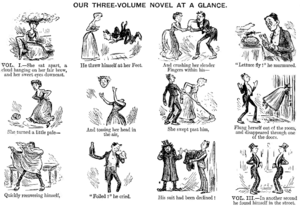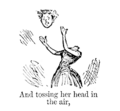Cliché facts for kids
A cliché (say "klee-SHAY") is a phrase, idea, or part of a story or artwork that has been used so much that it loses its special meaning or becomes boring. It might even become annoying, even if it was once new and interesting.
People often use the word "cliché" for an action or idea that is expected or predictable, based on something that happened before. Usually, when we call something a cliché, it's not a compliment. Some clichés are like stereotypes (overly simple ideas about groups), while others are just truisms (things that are obviously true). Clichés are sometimes used to be funny, especially in stories.
Many phrases that are now clichés were once fresh and exciting. But because they were used so often, they lost their impact. The French poet Gérard de Nerval once said that the first person to compare a woman to a rose was a poet (creative), but the second person to do it was an "imbecile" (not original). This shows how an idea can become old and unoriginal through overuse.
A cliché is often a strong way to describe an idea, often using comparisons or exaggerations. If used only a little, it might work well. However, using too many clichés in writing, speaking, or arguments usually shows that someone is new to it or lacks original ideas.
Contents
What is the Origin of the Word Cliché?
The word "cliché" comes from the French language. In the world of printing, "cliché" originally meant a metal plate or block used to print words or pictures over and over again. This is similar to how a phrase or idea gets "printed" in our minds repeatedly until it becomes common.
What are Some Examples of Clichés?
Here are some common examples of clichés:
- leave no stone unturned: This means to try every possible way to find something or solve a problem.
- none the worse for wear: This means someone or something is still in good condition, even after being used or going through a difficult experience.
- explore every avenue: Similar to "leave no stone unturned," it means to consider all possible options.
- food for thought: This refers to something that makes you think seriously about it.
- dead as a doornail: This is a very old and common way to say something is completely dead or broken.
- avoid like the plague: This means to strongly stay away from something or someone.
- the name of the game: This refers to the most important part or goal of a situation.
- the bottom line: This means the most important fact or the main point of something.
- there's no smoke without fire: This suggests that if there are rumors or signs of trouble, there is probably some truth to them.
- from time immemorial: This means for a very long time, longer than anyone can remember.
Images for kids
See also
 In Spanish: Cliché para niños
In Spanish: Cliché para niños
 | Jessica Watkins |
 | Robert Henry Lawrence Jr. |
 | Mae Jemison |
 | Sian Proctor |
 | Guion Bluford |




